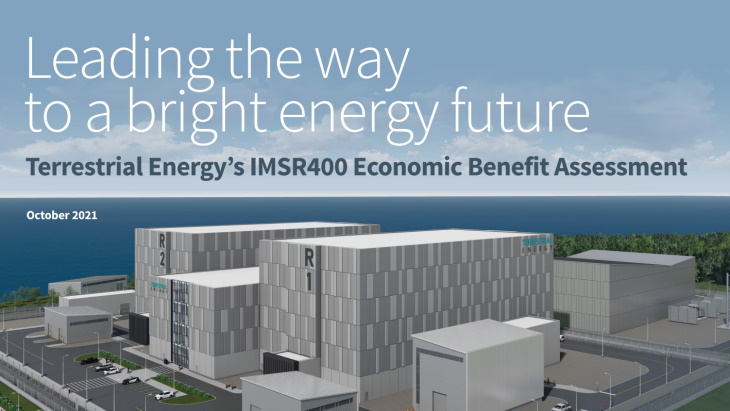The report, prepared by management, engineering and project delivery company Hatch Ltd, was commissioned by Terrestrial Energy, which is developing the Integral Molten Salt Reactor (IMSR). The IMSR400 is one of three SMR power plant technologies selected by OPG for further consideration for the Darlington New Nuclear Project, the others being GE Hitachi's BWRX-300 water-cooled SMR, and X-energy's Xe-100 high-temperature gas-cooled reactor.
The report identifies economic and so-called catalytic impacts if an IMSR400 were to be built at Darlington. In the report, Hatch estimates that the design and construction of a single IMSR400 at Darlington would create over CAD3 billion (USD2.4 billion) in total GDP over the nine-year design and construction phase, and generate nearly CAD6.6 billion of GDP for Ontario and CAD7.9 billion for the Canadian economy over the plant's entire 80-year life cycle from design through to decommissioning. It would support an average of 2,100 total jobs per year during the design and construction phase and 850 jobs per year in operation.
It also identifies what it refers to as the “catalytic impacts” - the broader benefits to the Canadian economy, including increased exports, first mover advantages, and "spillover" impacts, as knowledge gained may boost the productivity achieved by other sectors of the Canadian economy.
"The extent to which Canada and Ontario are able to capture the catalytic benefits will depend on the SMR technology chosen for the Darlington New Nuclear Project - the catalytic benefits are unlikely for a SMR technology developed outside of Canada as they will accrue instead to the country-of-origin of the SMR technology selected," the report notes. "When developing a new nuclear power plant technology, the technology developer is likely to work with its local supply chain to develop the proprietary technology and to continue to work with those same suppliers as the technology is rolled out," it adds.
Hatch's Global Managing Director Robert Francki said the study "reinforces" a strong Canadian supply chain. "The IMSR supply chain will create a strong strategic position for Ontario and Canada as nations pursue the enormous opportunities from Generation IV SMR technology and compete in a global market for zero-emission power generation," he said.
"This month, national leaders have been gathering in Glasgow for COP26 to discuss our planet’s transition to a net-zero economy and lay out credible pathways to achieve net zero," Simon Irish, CEO of Terrestrial Energy, said. "The IMSR, a Canadian Generation IV nuclear technology, developed in Canada with its many Canadian supplier partners, can make [a consequential] contribution to net zero for Canada and for Canada's trade partners, and the Darlington SMR project is the springboard. This is the once-in-a-generation environmental moment and a once-in-a-generation opportunity for Canada to build an industry of great export potential."






_63865.jpg)
_18570.jpg)
_16159.jpg)





